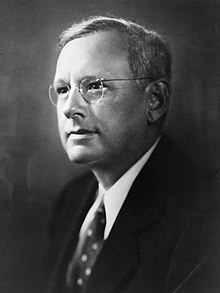
Back آلف لاندون AZB Alf Landon German Alf Landon Esperanto Alf Landon Spanish Alf Landon Finnish Alf Landon French אלף לנדון HE Alf Landon Italian アルフレッド・ランドン Japanese 앨프 랜던 Korean
Alf Landon | |
|---|---|
 Landon, c. 1936 | |
| 26th Governor of Kansas | |
| In office January 9, 1933 – January 11, 1937 | |
| Lieutenant | Charles Thompson |
| Preceded by | Harry Woodring |
| Succeeded by | Walter Huxman |
| Chairman of the Kansas Republican Party | |
| In office August 27, 1928 – August 26, 1930 | |
| Preceded by | Seth G. Wells |
| Succeeded by | John Hamilton |
| Personal details | |
| Born | Alfred Mossman Landon September 9, 1887 West Middlesex, Pennsylvania, U.S. |
| Died | October 12, 1987 (aged 100) Topeka, Kansas, U.S. |
| Resting place | Mount Hope Cemetery, Topeka |
| Political party | Republican |
| Other political affiliations | Progressive "Bull Moose" |
| Spouses | Margaret Fleming
(m. 1915; died 1918)Theo Cobb (m. 1930) |
| Children | 4, including Nancy |
| Education | University of Kansas (LLB) |
| Profession | Oil producer |
| Military service | |
| Branch/service | United States Army |
| Years of service | 1918–1919 |
| Rank | |
| Unit | Chemical Corps |
| Battles/wars | World War I |
Alfred Mossman Landon (September 9, 1887 – October 12, 1987) was an American oilman and politician who served as the 26th governor of Kansas from 1933 to 1937. A member of the Republican Party, he was the party's nominee in the 1936 presidential election, and was defeated in a landslide by incumbent president Franklin D. Roosevelt. The margin of victory in the electoral college was the largest of Roosevelt's four elections to the office of president, as Landon won just 8 electoral votes to Roosevelt's 523. Landon died on October 12, 1987, becoming the only presidential candidate from either of the major parties to live to the age of 100 until Jimmy Carter in 2024, and is to date the only Republican candidate to do so.
Born in West Middlesex, Pennsylvania, Landon spent most of his childhood in Marietta, Ohio, before moving to Kansas. After graduating from the University of Kansas, he became an independent oil producer in Lawrence, Kansas. His business made him a millionaire, and he became a leader of the liberal Republicans in Kansas. Landon won election as Governor of Kansas in 1932 and sought to reduce taxes and balance the budget in the midst of the Great Depression. He supported components of the New Deal but criticized aspects that he found inefficient.
The 1936 Republican National Convention selected Landon as the Republican Party's presidential nominee. He proved to be an ineffective campaigner and carried just two states in the election, neither of which was Kansas despite him being the sitting governor of that state. After the election, he left office as governor and never sought public office again. Later in life, he supported the Marshall Plan and President Lyndon B. Johnson's Great Society programs. He gave the first in a series of lectures, now known as the Landon Lecture Series, at Kansas State University. Landon lived to the age of 100 and died in Topeka, Kansas, in 1987. His daughter, Nancy Kassebaum, represented Kansas in the United States Senate from 1978 to 1997.